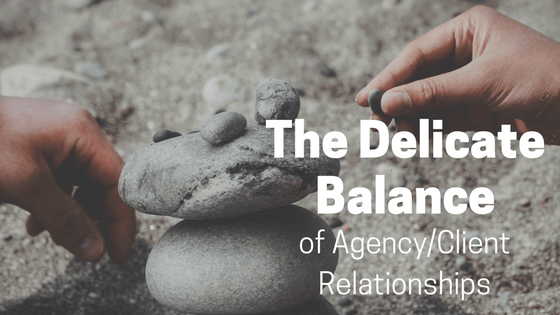A wise person once said, “An agency is only as good as its clients,” or… something like that. Either way, one thing on which we can all agree is that an agency can’t function without clients. Hard work goes into gaining clients because they are the livelihood of agency life. And, although an agency doesn’t exist without clients, the two need to share a healthy relationship in order for both parties to thrive. In the wild, this is called symbiosis; I’ll scratch your back if you’ll scratch mine.
This relationship is a delicate balance that requires attention and nurturing in order to maximize the output for the two sides. Below are some of our top tips to maintain said balance:
1. Set mutual goals
While both you (the agency) and your clients likely have in-house goals for your work together, setting mutual goals is just as important. This is typically done at the beginning of the relationship, as well as on a project-to-project basis. This helps to set expectations so that neither of you is displeased or unclear in your working relationship. Remember, you’re on the same team!
2. Take every opportunity to build credibility
Whether you have worked together for a week or a year, every encounter, every project is an opportunity for gained or lost credibility. It is vital to be aware of this and use it to your advantage—even something as small as a typo in an email can be detrimental. Sometimes the relationship with a client and how to behave is best compared to that of a dating relationship: be honest, put your best foot forward, be dependable and trustworthy, take initiative, and don’t be afraid to lead the way.
3. Transparency is key
Branching off of point number two, transparency is a most crucial element of building credibility. Should you be transparent? Absolutely. Should you do so with negligence of tact and professionalism? Never! There is grace to be had in transparency—and no, we don’t mean sugar coating. What we do mean, is to always communicate the bad news with some silver lining; be it a plan B, good news that accompanies the bad, or something that proves your worth. Trust your client to be able to tolerate any potential bad news as long as the situation is delivered respectfully, in a timely manner, and with the initiative of outlining the net steps to take.
4. Be respectful of time
To many business professionals, there is nothing worse than wasting time. Be there, be on time, all the time. It’s as simple as that. And, when you have their attention, stay on topic and be efficient with what you have to say. Don’t talk in circles, just be quick and to the point. Conversations happen much more quickly in person or over the phone anyways, and this gives you even more time to produce the excellent work your client has hired you for.
5. Under-promise and over-deliver
Although the Golden Rule is “Do unto others as you would have them do unto you”, the business world version of this is “under-promise and over-deliver”. Living by this rule will keep you on track for success, happy clients, and much more. Doing the opposite, well, we won’t go there. But if you take a moment and think about it from a client’s point of view, would you rather have high expectations and be completely disappointed by the result, or have realistic expectations and be completely blown away and thrilled with the result. We choose the latter. What do you think?
These five tips don’t cover every minute detail comprised within beautiful and complex client/agency relationships, but they cover the broadest and most imperative parts. And if you ever have trouble determining how to handle a situation, just go back to putting yourself in their shoes and think about how you would want things to be handled. If that doesn’t help, come back to this article or reach out to your team. Your agency team is what makes the magic happen, so we encourage you to treat them in the high regard we illustrate here.
In your work, what advice have you found helpful for navigating agency/client relations?



